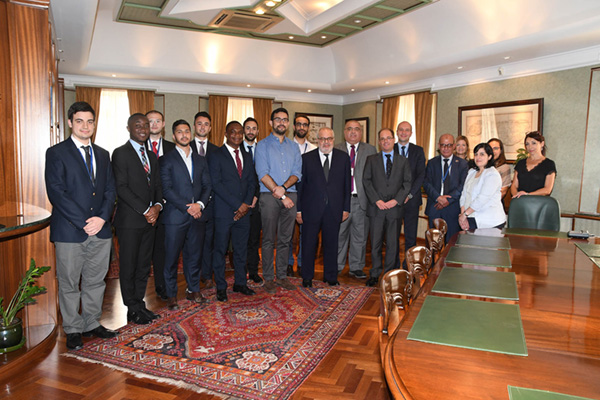Relations with international institutions
The Central Bank of Malta is a member of the European System of Central Banks (ESCB). The Governor and other officials of the Bank actively participate in the decision making of these institutions.
The ESCB is composed of the European Central Bank (ECB) and the national central banks (NCBs) of all European Union Member States: Banque Nationale de Belgique, Deutsche Bundesbank, Eesti Pank, Central Bank of Ireland, Bank of Greece, Banco de España, Banque de France, Banca d'Italia, Central Bank of Cyprus, Latvijas Banka, Lietuvos bankas, Banque centrale du Luxembourg, De Nederlandsche Bank, Oesterreichische Nationalbank, Banco de Portugal, Banka Slovenije, Národná banka Slovenska, and Suomen Pankki.
The other members of the ESCB include:
Bulgarian National Bank, Ceská Národní banka, Danmarks Nationalbank, Hrvatska Narodna Banka, Magyar Nemzeti Bank, Narodowy Bank Polski, Banca Nationala a României, and Sveriges Riksbank.
The Central Bank of Malta, the MFSA and the Ministry for Finance and Financial Services are signatories to the 2005 Memorandum of Understanding on co-operation between the Banking Supervisors, Central Banks and Finance Ministries of the European Union in Financial Crisis situations. This Memorandum was extended by the 2008 Memorandum of Understanding on ‘Cooperation between the Financial Supervisory Authorities, Central Banks and Finance Ministries of the European Union on Cross-Border Financial Stability’ to facilitate the management and resolution of cross-border systemic financial crises.
The Bank also maintains relations with international economic and financial institutions of which Malta is a member. These institutions include the International Monetary Fund (IMF), the World Bank Group, the European Bank for Reconstruction and Development (EBRD) and the Asian Infrastructure Investment Bank (AIIB).

The Bank regularly monitors developments within all these institutions and co-operates with such institutions in furthering the implementation of new initiatives falling within their mandate, particularly those related to international monetary and financial stability and economic development.
The IMF maintains close links with the monetary authorities in member states in order to ensure a stable international monetary and exchange rate system. The close relationship between the Bank and the IMF stems from statutory obligations assumed when Malta joined the Fund in 1968. The Bank is responsible for conducting all Malta's financial transactions with the Fund on behalf of the Government of Malta.
The Bank also maintains the status of observer at the BIS and a non-voting member at the EBA.
Non-European Union, Bilateral and Commonwealth Relations Office
During 2019, the Non-European Union (EU), Bilateral and Commonwealth Relations Office was established within the International Relations Department.
The office is involved in numerous projects aimed at fostering and deepening the Bank’s ties of co-operation with other central banks in the region and beyond. The office’s work also includes research in relevant sectors and policy issues, including matters pertinent to social and political stability and geopolitical risk relating to (but not limited to) the non-EU countries’ categories.
Governors' ex ufficio role
The Governor of the Central Bank of Malta has been a member of the General Council of the ECB since 1 May 2004, when Malta joined the European Union, and a member of the ECB's Governing Council since 1 January 2008, when Malta adopted the euro as its currency.
The Governor accompanies the Minister for Finance and Financial Services at the informal meetings of the Economic and Financial Affairs (ECOFIN) Council of the EU while senior officials take part in the Economic and Financial Committee (EFC) which advises the Council on economic and financial matters. Other staff members participate in the Committee for Monetary, Financial and Balance of Payments Statistics (CMFB), which assists the European Commission in drawing up and implementing work programmes concerning statistical issues.
The Governor has been a member of the General Board of the European Systemic Risk Board (ESRB) since its establishment on 1 January 2011.
Officials from the Central Bank of Malta participate in various committees of the EU, the ESCB and the ESRB.
The Governor is the Alternate Governor for Malta on the Board of Governors of the IMF.
The Governor is also Alternate Governor for Malta on the Board of Governors of the EBRD and of the AIIB.
He also attends the Annual General Meeting of the BIS in an observer capacity. The Deputy Governor accompanies the Minister for Finance and Financial Services for international meetings held by these institutions.
The Deputy Governor is a member of the ECB Supervisory Board.
The Deputy Governor attends meetings of the EBA as a Central Bank representative, along with officials from the MFSA. The Deputy Governor is a non-voting member of the Board of Supervisors of the EBA.
International Central Banking Courses
The Central Bank of Malta, together with the School of Economics of the University of Nottingham, organised two training courses about central banking in 2019. The courses were delivered by University of Nottingham staff at the Central Bank of Malta in Valletta. Due to COVID-19, the courses due to be held in 2020 were put on hold.
The training initiative was part of a campaign aimed at strengthening the Central Bank of Malta's ties of co-operation with other central banks in the region and beyond.
CBM Nottingham International Courses Brochure
